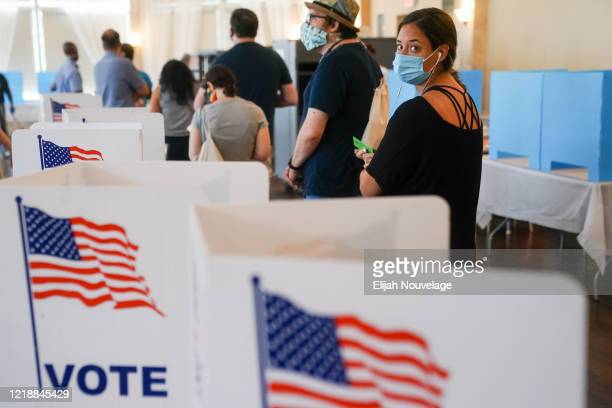Georgia Passes Law to Limit Voting, as Wave of Voter Restrictions Sweeps America

Credit: Elijah Nouvelage, Getty Images
After historic state turnout and a surprising Democratic victory in Georgia last November (and again this January), the Georgia State Senate passed a new bill this Monday to restrict absentee voting in the Peach State.
The bill, SB 241, will have major effects: more than one million Georgians cast their ballots this November through no-excuse absentee voting, a system created in 2005 by the state’s Republican legislature. The new law places severe restrictions on who can vote by mail, limiting absentee ballots only to select groups and requiring absentee voters to present photo ID’s.
The Senate will also soon vote on several other restrictive election laws, including a bill to end automatic voter registration when people get their driver’s license. Another bill that recently passed the Georgia House will prevent volunteers from providing free food to people waiting in voting lines, restrict the use of ballot drop boxes, and limit early voting on Sundays.
It is very likely that Black and Democratic voters will be disproportionately affected by these new rules. African Americans tend to face longer lines, and have historically voted in large numbers on Sundays with their church communities. And though Republicans and Democrats used to vote absentee at relatively equal rates, misinformation and the pandemic mean that Democrats have become more likely to vote by mail.
1. Are other states considering similar pieces of legislation?
The Peach State is not alone in its attempts to restrict voting. Across the country, GOP lawmakers are currently considering over 250 bills with provisions to limit voting in 43 states. Many of these bills seek to limit access to absentee voting and to require voter IDs at the polls.
Republicans argue that these laws are necessary to prevent voter fraud, a crime they claim was widespread during the last election. There is currently no evidence to support this claim, however, and Republicans lost every single court case alleging voter fraud in the 2020 election.
Moreover, experts on the right agree that eliminating absentee voting does nothing to combat fraud—already a rare and isolated phenomenon—and “may instead suppress voter turnout.” A report from a conservative think tank, R Street, found that policies that result in exceedingly long voting lines do qualify as voter suppression, and threaten to undermine voter confidence in the electoral process.
2. What can we do to protect the vote?
If new voting restrictions disproportionately disenfranchise minorities, then these bills could be subject to lawsuits under the Voting Rights Act. Unfortunately, recent Supreme Court rulings have greatly weakened the landmark 1965 voting law, and just this week, the Supreme Court seemed poised to make it more difficult to challenge potentially discriminatory legislation.
This means that restrictive voting laws may be more successfully addressed through legislative and executive avenues, rather than through the courts.
One option for doing so is through HR1, a massive voting rights bill that just passed the House this week. Among other provisions, HR1 would create new national automatic voter registration, expand early voting, prohibit states from restricting vote-by-mail, end partisan gerrymandering, and restore voting rights to ex-felons. In short, HR1 could revolutionize the American voting system–but it has slim chances of passing the Senate, where it needs at least ten Republican votes.
Though electoral reform has become a partisan issue, it shouldn’t be. Attempts to restrict access to the ballot box represent an existential threat to our democratic system. Ensuring fair and equal access to the vote is a matter of living up to our country’s values, and ensuring the integrity of our democracy for years to come.



